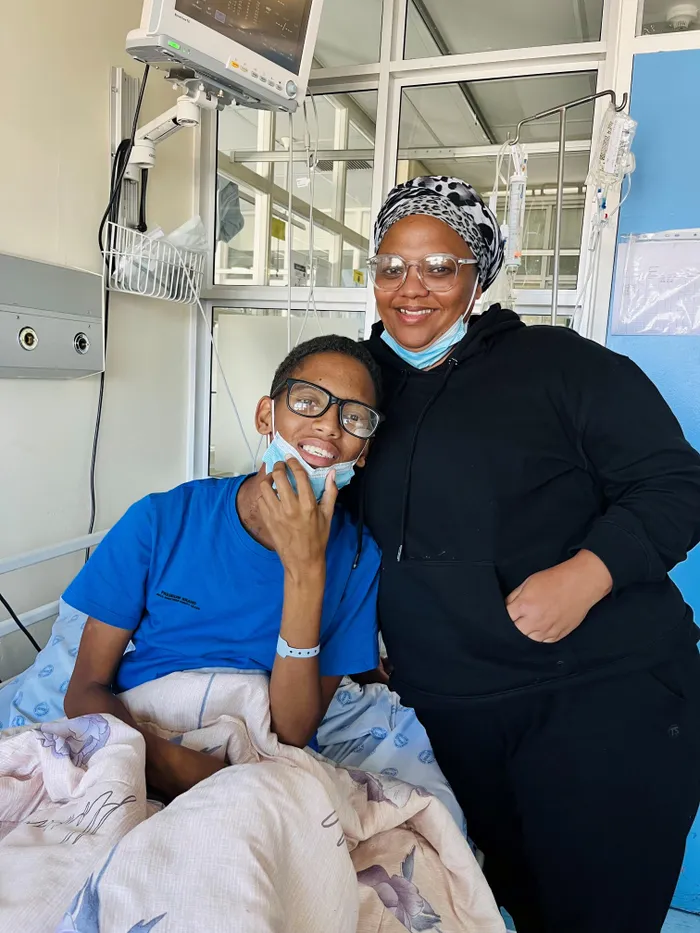Celebrating a milestone: 300th kidney transplant at Red Cross War Memorial Children’s Hospital

Cee-Jay and his mother, Alicia Zimmerie are ecstatic to be going home after his kidney transplant.
Image: Supplied
The Red Cross War Memorial Children’s Hospital in Cape Town celebrated its 300th kidney transplant this week.
This marks a milestone for the paediatric hospital, a leading centre of child health in the country, that first opened its doors in 1956.
The hospital performed its first renal transplant in 1968.
Cee-Jay Zimmerie, 17, was the 300th recipient and was overwhelmed with joy.
“I feel so much relief. I was nervous before the operation. I was also shocked initially when I became sick without warning. I had to mentally prepare myself for surgery last week, and I am very happy it went well,” the teenager explained.
His mother, Alicia, who has been at his side throughout it all, said she remembered the day her son was diagnosed with end-stage kidney disease.
“He was only 14 and we were at Groote Schuur [Hospital] at the time when we were told he would need a transplant and started visiting Red Cross. We’re grateful for all of the support from the healthcare workers,” she said.
Head of the Clinical Unit of Paediatric Nephrology and Solid Organ Transplantation, Professor Mignon McCulloch, expressed her joy.
“We are absolutely delighted to have celebrated our 300th, 301st and 302nd kidney transplants in the last week. We are enormously grateful to the families of the donors who have donated their family members' organs. We are very grateful, as are our paediatric patients and their parents, for giving them a new lease of life and getting them off dialysis. All three of them were on dialysis for a long time,” she said.
Professor McCulloch said these transplants are only possible through teamwork.
“We are also grateful for our wonderful teams at Red Cross and Groote Schuur, including surgeons, paediatricians, dieticians, social workers, nurses, intensivists, anaesthetists, managers, and the list goes on. It really does take a team for a successful transplant in children,” she said.
The hospital said organ donation can save lives and give people, like Cee-Jay, a second chance at life, allowing them to enjoy their childhood with their family and friends.
Transplants are carried out by a dedicated team of healthcare professionals who offer comprehensive support to both patients and their families throughout the process.
Cee-Jay and two other patients will be heading home this weekend with a new lease on life.
How do you get involved?
Did you know that you can donate your tissues? Organ donation and tissue donation are both crucial components of medical treatments in adults and children, but they involve different types of donations and have different purposes.
It’s essential to talk to your family about your decision and ask them to respect your wish to donate your organs and tissues after death. Even if you haven’t signed up to be a donor, it is important to speak to your family about the option of donating your organs in the event of death. There are no costs involved, and your family will not be responsible for any medical expenses.
Solid organs include your heart, liver and pancreas and lungs, while tissue donations include your corneas, skin, bone, tendons and heart valves. An example of a tissue donation includes corneal transplants to restore vision or skin grafts for burn survivors.
You can help at least 50 people through tissue donation.
Registering as an organ donor is simple. You can sign up online or call the Organ Donation Foundation toll-free line at 0800 22 66 11 or visit https://odf.org.za
After registering, you’ll receive a small donor card to carry with you, along with stickers for your ID and driver’s licence.
robin.francke@iol.co.za
IOL
Related Topics:
